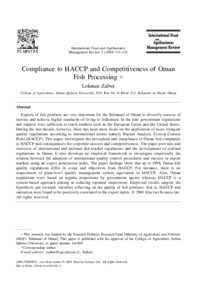Document
Compliance to HACCP and competitiveness of Oman fish processing.
Identifier
DOI: 10.1016/s1096-7508(01)00050-7
Source
International Food and Agribusiness Management Review. v. 3, 3, p. 311-321
Country
United States.
City
Washington
Publisher
International Food and Agribusiness Management Association.
Gregorian
2000-01-01
Language
English
Subject
English abstract
Exports of fish products are very important for the Sultanate of Oman to diversify sources of income and achieve higher standards of living to fishermen. In the past government regulations and support were sufficient to reach markets such as the European Union and the United States. During the last decade, however, there has been more focus on the application of more stringent quality regulations according to international norms namely Hazard Analysis Critical Control Point (HACCP). This paper investigates the perception and compliance of Oman fish companies to HACCP and consequences for corporate success and competitiveness. The paper provides and overview of international and national fish market regulations and the development of seafood regulations in Oman. It also develops an empirical framework to investigate empirically the relation between the adoption of international quality control procedures and success in export markets using an export penetration index. The paper findings show that up to 1998, Oman fish quality regulations differ in scope and objectives from HACCP. For instance, there is no requirement of plant-level quality management system equivalent to HACCP. Also, Oman regulations were based on regular inspections by government agents whereas HACCP is a system-based approach aiming at reducing repeated inspections. Empirical results support the hypothesis put forward; variables reflecting on the quality of fish products, that is, HACCP and sanitation were found to be positively correlated to the export index.
ISSN
1559-2448
Category
Journal articles

